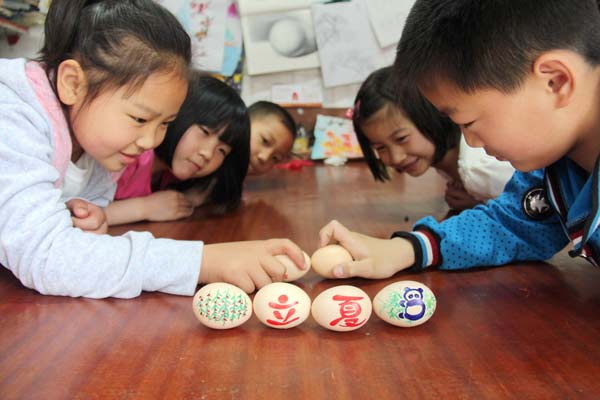Success may be written in the stars
Updated: 2013-06-10 02:33
By WU YIYAO in Shanghai (China Daily)
|
||||||||
|
 |
|
Children at an arts training center in Yunxian county, Shiyan, Hubei province, play an egg fighting game on May 5, the day summer begins.Cao Zhonghong / for China Daily |
The ancient system of dividing the year according to solar themes is being used by businesspeople to boost sales
"Lychees for June 5; cherries for June 21; waxberries for July 7," intoned Wang Lanzhi, a 46-year-old Shanghai housewife, as if reciting a poem. This routine has been directing her purchases and use of fruit for decades, she said.
For Wang, food shopping is not dictated by price. Instead, the zodiac rules what she eats every fortnight of the year.
Like buying carnations on Mother's Day or roasting a bird near the end of the year, buying roasted green tea during the guyu period in mid April,which is also known as "grain rain", and making plum syrup on xiazhi, or summer solstice, is essential for Chinese who follow an annual cycle of 24 solar periods.
The Chinese initiated the system as early as 2,000 years ago, and it has now blended with modern lifestyles.
The zodiacal cycle is divided into 24 segments, each lasting roughly two weeks. In the lunar calendar, the date of each solar term is more or less fixed, apart from minor changes of a day or so.
"The 24 solar periods were determined by changes in the sun's position throughout the year, so the system is based on the duration of sunlight per day, temperature, humidity and other factors affecting the cultivation of grain, vegetables, fruit and breeding of livestock. They also determine outdoor activities and indoor entertainment," said Wang.

 Michelle lays roses at site along Berlin Wall
Michelle lays roses at site along Berlin Wall
 Historic space lecture in Tiangong-1 commences
Historic space lecture in Tiangong-1 commences
 'Sopranos' Star James Gandolfini dead at 51
'Sopranos' Star James Gandolfini dead at 51
 UN: Number of refugees hits 18-year high
UN: Number of refugees hits 18-year high
 Slide: Jet exercises from aircraft carrier
Slide: Jet exercises from aircraft carrier
 Talks establish fishery hotline
Talks establish fishery hotline
 Foreign buyers eye Chinese drones
Foreign buyers eye Chinese drones
 UN chief hails China's peacekeepers
UN chief hails China's peacekeepers
Most Viewed
Editor's Picks

|

|

|

|

|

|
Today's Top News
Shenzhou X astronaut gives lecture today
US told to reassess duties on Chinese paper
Chinese seek greater share of satellite market
Russia rejects Obama's nuke cut proposal
US immigration bill sees Senate breakthrough
Brazilian cities revoke fare hikes
Moody's warns on China's local govt debt
Air quality in major cities drops in May
US Weekly

|

|







